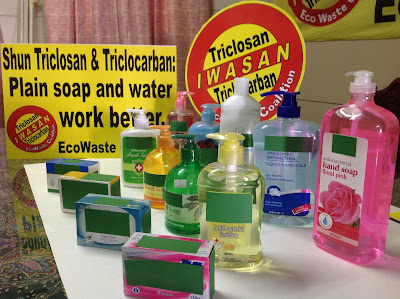Consumers Urged to Skip Antibacterial Products Containing Triclosan and Triclocarban (Expert says antibacterials are no more effective than plan soap and water in reducing disease)
A non-profit toxics watch group urged consumers to refrain from using antibacterial soaps and washes containing triclosan and triclocarban as a historic ban in US on such products looms.
At a press briefing held today, the EcoWaste Coalition noted that a ban on the marketing of consumer antiseptic wash products containing antibacterials triclosan and triclocarban will take effect on September 6, 2017 as ordered by the US Food and Drug Administration (FDA).
In light of such policy, the group called on Filipino consumers to use their buying power and influence to make companies switch to safer formulations by patronizing products that are free of triclosan, triclocarban and other chemicals of concern.
Triclosan and triclocarban are among the 19 antibacterials being banned by the federal agency “because manufacturers did not demonstrate that the ingredients are both safe for long-term daily use and more effective than plain soap and water in preventing illness and the spread of certain infections.”
Dr. Ann Blake, a visiting public health and environmental expert from US who spoke at the event, pointed out “studies have indicated increased evidence of both health and environmental harm linked to the use and disposal of triclosan and its chemical cousin triclocarban, with no benefit to humans and the ecosystems."
Antibacterials (including triclosan, triclocarban) and quaternary ammonium products (“quats”) are medical disinfectants that have been increasingly added to a variety of personal care and household cleaning products.
“The claim of supposed ‘antibacterial protection’ from the use of such products is not backed up by scientific evidence. Plain soap and water work better in reducing infection and disease,” Blake said.
“These antibacterials are often marketed as a way to protect consumers from ‘superbugs’when in fact they contribute to antibiotic resistance,” she said, adding that “superbugs originate from the use of ‘preventive’ dosing of antibiotics in industrial meat production for cows, pigs and chickens.”
Environmentalist Rene Pineda of the EcoWaste Coalition noted that the biggest use for triclosan and triclocarban are in antibacterial soaps, hand and body washes and related products that are discharged in wastewater drains.
“Disposed of in residential drains, these chemicals, which are highly toxic to aquatic organisms, can accumulate in water bodies, affect the balance of the fragile marine ecosystems and result in hazardous residues in fish that we eat,” he said.
Another concern that Pineda highlighted is that these chemicals could be transformed into chloroform and dioxin compounds with exposure to sunlight or when interacting with chemicals such as chlorine in tap water.
For better health and hygiene, Blake and Pineda stressed the importance of washing hands frequently with ordinary soap and water to wash away harmful bacteria, especially when preparing food, before eating, after going to the toilet, and when a member of the family is sick.
At the press briefing, the EcoWaste Coalition also appealed to companies, both foreign and local, to phase out the use and sale of consumer products containing triclosan and triclocarban starting with over-the-counter antibacterial soaps and washes.
The group last week conducted test buys of antibacterial soaps and washes and found many products listing triclosan or triclocarban among their ingredients.
The group noted that leading manufacturers including Avon, Johnson & Johnson, Procter & Gamble, Unilever and others have phased out triclosan and triclocarban and reformulated products containing these antibacterials.
-end-
Reference:
https://www.fda.gov/newsevents/newsroom/pressannouncements/ucm517478.htm
https://www.beyondpesticides.org/assets/media/documents/antibacterial/triclosan-research-3-09.pdf







Comments